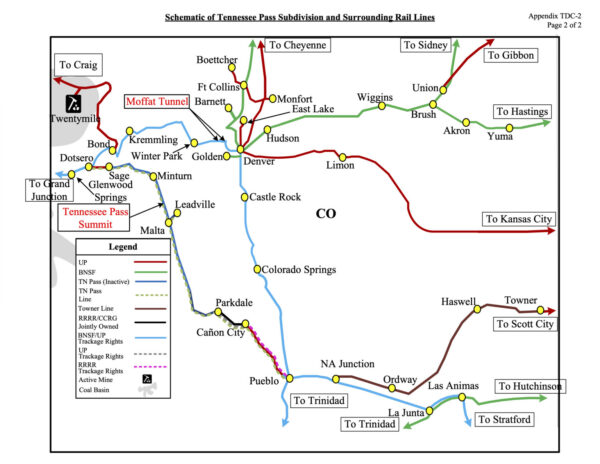Feds reject request for streamlined approval of lease deal on UP’s Tennessee Pass rail line

The U.S. Surface Transportation Board — the federal agency that oversees railroads — has rejected a request by newly formed Colorado, Midland & Pacific Railroad for expedited approval of its freight and passenger lease agreement with Union Pacific, which owns the long-dormant Tennessee Pass Line through Eagle County.
“The verified notice of exemption … will be rejected (and a motion to amend will be denied and a motion for access to confidential documents rejected as moot) because the proposed lease and operation transaction is not appropriate for consideration under the Board’s streamlined class exemption procedures,” the STB wrote Thursday.
The motion to amend was first reported by RealVail.com last week and was an attempt by Colorado Midland to get the STB to restrict the transport of oil in order to ease environmental concerns. The motion for access to documents was filed by Colorado Pacific Railroad, a separate company trying to acquire the line that opposes the lease deal between Colorado Midland and UP. Both companies are exploring passenger service as well as freight on the line.
“Numerous comments opposing the proposed lease and operation transaction have been filed in both dockets by organizations, individuals, and local governmental entities expressing various environmental and other concerns about resuming rail service on the Line,” the STB wrote Thursday.
The Colorado Sun first reported Thursday’s rejection by the STB of Colorado Midland’s petition for an expedited approval of its lease with UP for just over 160 miles of the line between Sage (near the Eagle County Regional Airport) and Parkdale.
Any company still wishing to move forward with reviving all or part of the 220-mile line between Pueblo and Dotsero would presumably now have to go through either a much more extensive Environmental Assessment or an even more rigorous Environmental Impact Statement process.
However, the STB did not commit to conducting either an EA or and EIS of the lease if Colorado Midland submits again, saying instead that certain thresholds have to be met for that to happen and requiring Colorado Midland to specify in future filings “the number of trains that [Colorado Midland] expects to operate in the reasonably foreseeable future.”
The STB stated the lease deal raises competitive issues, “as well as questions concerning interchange operations and the nature of actual or anticipated operating rights over portions of the line.”
Colorado Pacific Railroad first objected to the deal earlier this year citing monopolistic control by UP over westbound freight through the state of Colorado. UP owns and controls the active Moffat Tunnel Line, which comes out of Denver, crosses the divide at the tunnel, travels along the headwaters of the Colorado River, connects with the Tennessee Pass Line at Dotsero and then heads west through Glenwood Canyon.
Colorado Midland, whose parent company, Rio Grande Pacific, is involved in the oil transportation business in other parts of the country as well as a prospective project in Utah, had conducted a listening tour insisting it’s primarily interested in passenger service.
Colorado Pacific, which tried to buy the line from UP, had offered a passenger train from Pueblo to Minturn, but is primarily focus on moving agricultural freight from Colorado and Kansas to the West Coast.
“We are reviewing today’s decision by the STB and will consider next steps,” Colorado Midland spokeswoman Sara Cassidy emailed late Thursday.
Colorado Pacific officials declined to comment on Thursday’s STB decision, but late last week provided a lengthy statement about Colorado Midland’s attempt to restrict oil on the line — a move that was rejected by the STB — as well as the prospects for commuter service in the mountain counties along the line:
“CMPR’s [Colorado Midland’s] filing was unusual because it asks the STB to limit the terms of its lease with UP, rather than UP and CMPR exercising their right to do so as parties to that agreement. Be that as it may, if the STB grants the request it will not eliminate the underlying issue of whether crude oil, coal or hazardous commodities traverse the line because UP is the underlying owner of the line and it cannot refuse to transport those commodities if someone makes a reasonable request for service. Colorado Pacific’s position remains that the simplified STB approval process UP and CMPR have attempted to use is not appropriate for this line, and that UP and CMPR should disclose to Colorado Pacific the restrictions on competition with other railroads that UP has inserted into the lease. This disclosure is permitted by STB rules. Colorado Pacific’s primary objective is to ensure that the Tennessee Pass be a viable alternative to UP’s Moffat Tunnel route for freight traffic, with access to both western class one carriers at each end. In satisfaction of a statutory need to ‘serve the public convenience and necessity’ Colorado Pacific has also offered to provide at its expense once daily roundtrip passenger service each way between Pueblo and Minturn, which service could be extended as far west as the Eagle Valley Airport. However, Colorado Pacific considers that there is inadequate population density to support commuter rail in the Eagle Valley, and will not be pursuing that objective. Commuter rail projects are traditionally subsidized by public funds, and the local tax base seems insufficient for such purpose. Commuter rail in the Eagle Valley is a chimera.”


Latest posts by David O. Williams (see all)
- During National Small Business Month, Target, DreamSpring put funding bullseye on underrepresented communities in Denver area - May 29, 2025
- Colorado senator urges Supreme Court to hold Trump administration in contempt on deportations - April 19, 2025
- Conductor who brought back Colorado ski train wants to use rail to save state’s highways for skiing - March 20, 2025

You must be logged in to post a comment Login